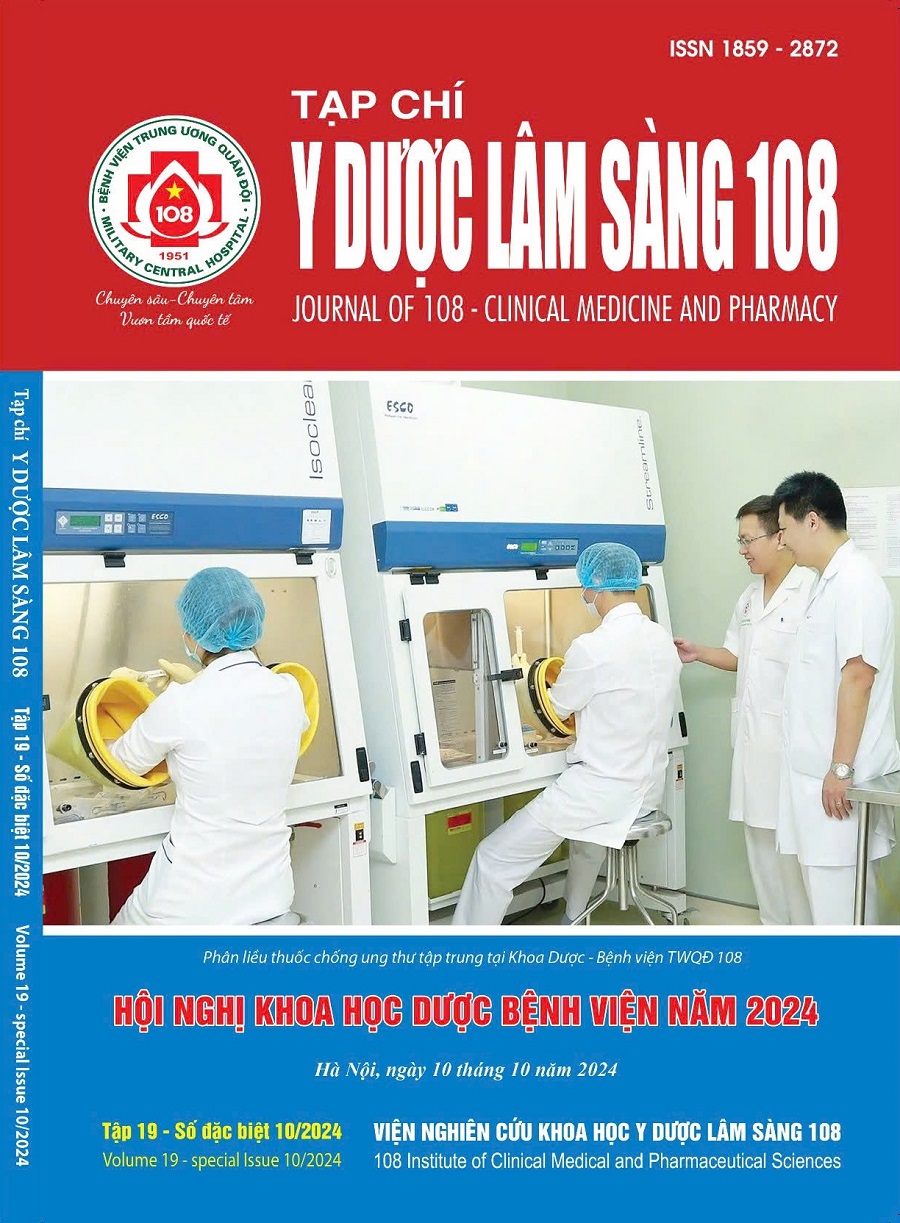Survey on the level of knowledge and adherence to immunosuppressive therapy in patients after kidney transplantation at 108 Military Central Hospital
Main Article Content
Keywords
Abstract
Objective: To survey the knowledge and adherence to immunosuppressants among outpatient kidney transplant recipients at 108 Military Central Hospital and to determine the factors influencing these outcomes. Subject and method: A cross-sectional descriptive study was conducted using interviews with 94 kidney transplant patients. Patients' knowledge of immunosuppressant use was assessed using the Bertrams et al. questionnaire. Patients' adherence with using immunosuppressants was assessed using the BAASIS questionnaire. Boosting classification algorithm was applied to identify and assess the influence of factors affecting knowledge scores. BMA (Bayesian Model Averaging) method was used to build a model of factors influencing patient adherence. Result: The average knowledge score of patients was recorded as 6.0 ± 1.2 points. Knowledge score was associated with BK virus (BKV) infection at 26.16%, followed by information sources from the Internet and product information leaflets, contributing 19.73% and 18.59%, respectively. The adherence rate among patients was 76.6%. Patients with a post-transplant period of ≥ 2 years and knowledge score of < 6 points had the lower risk of adherence, with p=0.011 and p=0.046, respectively. Conclusion: Most patients demonstrated high knowledge scores and good adherence to treatment. Those with a post-transplant period of more than 2 years and knowledge scores below 6 had lower adherence.
Article Details
References
2. Nguyễn Hoàng Anh, Đàm Mai Hương, Vũ Đình Hoà, Nguyễn Quang Nghĩa, Trần Mạnh Tuấn (2015) Khảo sát liều dùng và nồng độ tacrolimus ở bệnh nhân ghép thận tại Bệnh viện Hữu Nghị Việt Đức. Tạp chí Dược học 55 (5), tr. 2-6.
3. Ganjali R, Ghorban Sabbagh M, Nazemiyan F et al (2019) Factors Associated With Adherence To Immunosuppressive Therapy And Barriers In Asian Kidney Transplant Recipients. Immunotargets Ther 8:53-62. doi:10.2147/itt.S212760.
4. Nevins TE, Robiner WN, Thomas W (2014) Predictive patterns of early medication adherence in renal transplantation. Transplantation 98(8): 878-884. doi:10.1097/tp.0000000000000148.
5. Bertram A, Pabst S, Zimmermann T, Schiffer M, de Zwaan M (2016) How can you be adherent if you don't know how? Transpl Int 29(7): 830-832. doi:10.1111/tri.12784.
6. Đàm Thị Thu Hằng (2023) Đánh giá kiến thức và tuân thủ điều trị thuốc ức chế miễn dịch trên bệnh nhân ghép thận tại Bệnh viện Bạch Mai. Trường Đại học Dược Hà Nội; 2023.
7. Nursing Sience - Faculty of Medicine - University of Basel. BAASIS the basel assesment of adherence to immunoSuppresive medications Scale. https://baasis.nursing.unibas.ch/.
8. Lieb M, Hepp T, Schiffer M, Opgenoorth M, Erim Y (2020) Accuracy and concordance of measurement methods to assess non-adherence after renal transplantation - a prospective study. BMC Nephrol. 21(1): 114. doi:10.1186/s12882-020-01781-1.
9. James G, Witten D, Hastie T, Tibshirani R (2014) An introduction to statistical learning with applications in R.
10. Lennerling A, Forsberg A (2012) Self-reported non-adherence and beliefs about medication in a Swedish kidney transplant population. Open Nurs J 6: 41-46. doi:10.2174/1874434601206010041.
11. Chen T, Wang Y, Tian D et al (2022) Follow-up factors contribute to immunosuppressant adherence in kidney transplant recipients. Patient Prefer Adherence. 16: 2811-2819. doi: 10.2147/ppa.S383243.
12. Phạm Quốc Toản (2024) Nghiên cứu sự không tuân thủ điều trị thuốc ức chế miễn dịch ở bệnh nhân ghép thận tại Bệnh viện Quân y 103. Tạp chí Y Dược học Quân sự.
13. Belaiche S, Décaudin B, Dharancy S, Noel C, Odou P, Hazzan M (2017) Factors relevant to medication non-adherence in kidney transplant: A systematic review. Int J Clin Pharm 39(3): 582-593. doi:10.1007/s11096-017-0436-4.
14. Weng FL, Chandwani S, Kurtyka KM, Zacker C, Chisholm-Burns MA, Demissie K (2013) Prevalence and correlates of medication non-adherence among kidney transplant recipients more than 6 months post-transplant: A cross-sectional study. BMC Nephrol 14: 261. doi:10.1186/1471-2369-14-261
 ISSN: 1859 - 2872
ISSN: 1859 - 2872
